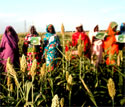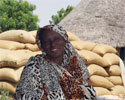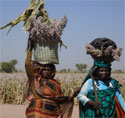 |
 |
 |
Project - Zenab for Women in Development |
 |
|
Zenab for Women in Development
zenab.org
The initial seed distribution was made. Read the challenges and success to date and how the project will proceed.
 Zenab for Women in Development is a Sudanese women's rights organization founded in 2000 that promotes the human rights and advances the social, economic and political status of rural women and girls who are responsible for much of the subsistence agriculture in their villages.
Zenab for Women in Development is a Sudanese women's rights organization founded in 2000 that promotes the human rights and advances the social, economic and political status of rural women and girls who are responsible for much of the subsistence agriculture in their villages.
Small-scale women farmers-typically between 20-50 years old- represent a large portion of the agricultural workforce, yet the government's aid programs traditionally exclude women, and deny them much needed credit and agricultural inputs that are typically available to men.
 This project is to support Sudan's first and only women's farmers union to strengthen locally-rooted adaptation to climate change, promote sustainable agriculture and build resilient livelihoods for women farmers. The stated objectives are:
This project is to support Sudan's first and only women's farmers union to strengthen locally-rooted adaptation to climate change, promote sustainable agriculture and build resilient livelihoods for women farmers. The stated objectives are:
- 1) Empower Sudanese women farmers to successfully harvest their own organic crops.
- 2) Build the capacity of women farmers to utilize sustainable agriculture techniques and improved practices to confront climate change and environmental degradation.
- 3) Replicate this learning to other community members.
These objectives will be achieved through the provision of high-yield, quality seeds, equipment to improve efficiency during harvest season, and technical assistance in agriculture, composting and sanitation.
 Unlike emergency food aid, this program gives women the tools, resources, and technical assistance they need to become self- sufficient, sustainable farmers able to support themselves and their families. With greater yields the food scarcity in the region diminishes- leading to better health, productivity and overall community development. As a result, it it possible not only to feed their families and communities, but be able to generate independent income and enhance decision-making power in households and communities. These women, in turn, create new, positive and broader impacts by further replicating the learning with their children, families and communities and reinvesting their knowledge and skills back into their communities and future. In fact, increased economic status has allowed many women farmers to reinvest profits into community development projects that promote the long-term sustainability of their communities. For example, participants have saved income from their harvest to provide health care and education for their daughters, freeing them from the responsibility to help with farm work and opening the chance at an education or other opportunities to further their political, economic and social empowerment and break the cycle of poverty. Other participants have used their extra income to open a pre-school and community center, facilitate an adult literacy program, bring electricity to their community and build wells that provide access to clean water.
Unlike emergency food aid, this program gives women the tools, resources, and technical assistance they need to become self- sufficient, sustainable farmers able to support themselves and their families. With greater yields the food scarcity in the region diminishes- leading to better health, productivity and overall community development. As a result, it it possible not only to feed their families and communities, but be able to generate independent income and enhance decision-making power in households and communities. These women, in turn, create new, positive and broader impacts by further replicating the learning with their children, families and communities and reinvesting their knowledge and skills back into their communities and future. In fact, increased economic status has allowed many women farmers to reinvest profits into community development projects that promote the long-term sustainability of their communities. For example, participants have saved income from their harvest to provide health care and education for their daughters, freeing them from the responsibility to help with farm work and opening the chance at an education or other opportunities to further their political, economic and social empowerment and break the cycle of poverty. Other participants have used their extra income to open a pre-school and community center, facilitate an adult literacy program, bring electricity to their community and build wells that provide access to clean water.
|
|
|